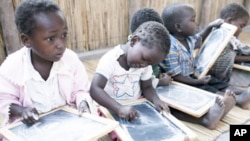Preschool, or early education, has long been a part of children’s lives in the U.S. Now, the benefits of preschool programs have been confirmed for rural African children.
The World Bank has given high marks to a preschool program in Mozambique. It’s run by the humanitarian organization Save the Children. The bank says it’s the first such evaluation of preschool in Africa. It studied about 2,000 households in 76 rural communities in the Gaza Province near the capital Maputo.
“It’s focusing on developing these young children’s motor skills, their psychosocial abilities; their early reading abilities; their early math abilities. Particularly, in Mozambique, we were focusing on children between 3 and 5 years old,” said Heather Simpson, senior director of education and child development for Save the Children.
Rare, but effective
While preschool programs are common in the United States and other developed countries, Simpson said they’re rare in African nations.
“Often young children between zero and 3 years old, the health systems are keeping track of them and they’re doing vaccinations and things like that. And then, when they turn about 5 or 6, they enter into the school systems and the ministries of education take them over. But these in-between years, they’re not being cared for by the health ministries and they’re not yet being looked after by the education ministries in many cases,” she said.
She added that the young students react positively from the beginning.
“They like to interact with their peers. They love having the chance to play, to learn, to read. So children really do thrive when they have a chance. Children are universal all over. They want to learn and develop and these programs do give them that chance,” she said.
What’s more, Simpson said, the World Bank evaluation clearly outlined the benefits of the preschool program.
“Children were about 24 percent more likely to enroll in primary school. And they also were significantly better equipped to learn than children who weren’t part of the program. Also children who were going to preschool school are more likely to show interest in math and writing. They can recognize shapes better and they show respect for other children as well. So there are socializing benefits as well,” she said.
Studies have shown long-term benefits of preschool include better job prospects later in life. There are also ripple effects.
“The kids who are actually in the program benefitted, but in many cases their older siblings benefitted, as well. If a school age child had a younger sibling participating in an early childhood program, they were more likely to be in school. And the parents of these children were also more likely to be working,” Simpson said.
The Save the Children preschool program was funded through a $1 million donation. It came from the American Idol TV show’s charity wing called Idol Gives Back. The cost per child for preschool in rural Mozambique is $2.50 a month.




